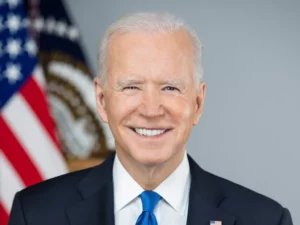 Robert F. Kennedy was one of Joe Biden’s formative political heroes, and now his namesake Robert F. Kennedy Jr. is one of Joe Biden’s prime political foes.
Robert F. Kennedy was one of Joe Biden’s formative political heroes, and now his namesake Robert F. Kennedy Jr. is one of Joe Biden’s prime political foes.
Initially, it appeared that Joe Biden would glide through the 2024 Democratic primaries without a serious primary challenger. Sure, 2020 candidate Marianne Williamson was already mounting her own bid, but she’s never gotten much traction in the polls either now or then.
In April, however, the black sheep of the Kennedy clan decided to throw his hat into the ring. RFK Jr – a textbook case of the horseshoe theory of politics – happens to be one of America’s loudest vaccine critics. That fact, combined with his famous name, led to him hitting 20% in a few early polls of his candidacy.
Yet in the weeks since, as Kennedy’s become more known by the Democratic electorate, his support has started to drop. At the moment, according to RealClearPolitics, he’s averaging 14.4% against Williamson’s 5.7% and Biden’s 64.0%.
As I’m wont to do, I sought to put this moment into historical perspective by comparing Biden’s standing right now, in the summer before his re-election year, to three of his recent Democratic predecessors.
Carter and Kennedy
Speaking of a Kennedy challenging a sitting Democratic President, this exact situation already occurred once before back in the 1980 primary.
As early as May 1978, President Jimmy Carter was struggling so severely that a majority of Democrats surveyed by Gallup preferred Ted Kennedy as the 1980 nominee instead. Such unpopularity was a result of Carter being both too moderate for the party’s liberal grassroots and too aloof for the party’s establishment.
Meanwhile, Kennedy was completely conflicted about pursuing the Presidency. On the one hand, he was the last surviving brother of two martyred Democratic heavyweights and thus subject to immense pressure to pick up the torch. On the other hand, he legitimately feared for his safety, his marriage was falling apart and the 1969 Chappaquiddick incident always hung over him.
By June of 1979, the enmity between Carter and Kennedy was reaching a boiling point. Just one day after a CBS News/New York Times poll found him 29 points behind Kennedy, the President made a point of telling Congressional Democrats “I’m going to whip his ass”.
It was the start of a particularly tumultuous summer for Carter, as a month later he gave his legendary “Malaise Speech” and then asked most of his Cabinet to resign. Kennedy, appalled at this display from Carter, finally decided to go ahead with his campaign. Ultimately, their long and bruising primary fight wound up helping Ronald Reagan win the White House.
Clinton and Jackson
In the aftermath of the disastrous 1994 midterms, allies were concerned that Bill Clinton would follow in the footsteps of his fellow Southern predecessor by facing his own primary challenger. Clinton had a major advantage in his favor, however, as no one in 1995 had the clout inside the Democratic Party that Ted Kennedy held in 1979.
Yet there still was someone who could cause trouble for him. After Jesse Jackson waged his own campaigns for the Democratic nomination in 1984 and 1988, he expected to be treated as a power broker by party leaders. Instead, in the summer of 1992, Clinton made a show of embarrassing Jackson by criticizing comments made by Rainbow Coalition member Sister Souljah.
Jackson never really forgave Clinton and made a show in 1995 of teasing a possible primary challenge or even a potentially devastating third-party bid. In fact, a March CBS/NYT poll found Clinton trailing Bob Dole by 6.5% with Jackson siphoning off 6.6%.
By the fall, however, a Congressional seat in Chicago suddenly opened up and Jackson’s namesake Jesse Jackson Jr. jumped at the opportunity. Apparently, Clinton and Jackson reached some rapprochement as the son won the race and the father withdrew his threat of an independent bid. Jackson Jr’s congressional career would ultimately end with charges of campaign fraud and a stint in prison, while another Chicago pol wound up earning the title of First Black President.
Obama and Hillary…and Bernie
By the time Barack Obama approached his re-election bid in 2012, it had been a good twenty years since an incumbent President faced a serious primary challenge. Nevertheless, that didn’t stop pollsters and pundits from speculating about one.
After Republicans flipped Ted Kennedy’s seat in a January 2010 special election upset, for instance, murmurs began to spread that perhaps Democrats would be better off in 2012 with Hillary Clinton at the top of the ballot. In September of that year, as massive midterm losses loomed on the horizon, Gallup asked Democrats about a hypothetical Obama-Clinton primary rematch. The highly popular Secretary of State received 37% against the incumbent President Obama’s 52%.
While nowhere near as strong as some of the numbers Teddy Kennedy put up, Clinton’s performance was far better than anything Robert Kennedy Jr’s managed to reach so far.
Finally, in July 2011, Bernie Sanders publicly aired his own trial balloon of a 2012 primary challenge from Obama’s left. Eventually then-Majority Leader Harry Reid convinced Bernie not to make such a move and Sanders waited until 2016 to launch a Presidential bid.
Conclusion
As you can see, Bill Clinton and Barack Obama both faced primary threats that never really materialized, while conversely Jimmy Carter had to deal with a challenge that helped end his Presidency. Biden appears to be stuck in a middle ground between them all. Kennedy Jr and Williamson seem likely to stay in the race through the primaries, yet also unable to seriously threaten Biden’s ability to win the nomination.
So unless circumstances change in some unexpected way between now and next summer’s Democratic Convention, these primary challengers will be no more than minor irritants to Joe Biden’s re-election hopes.